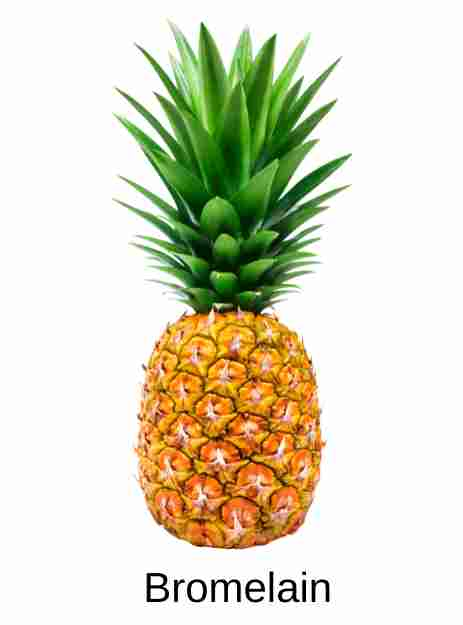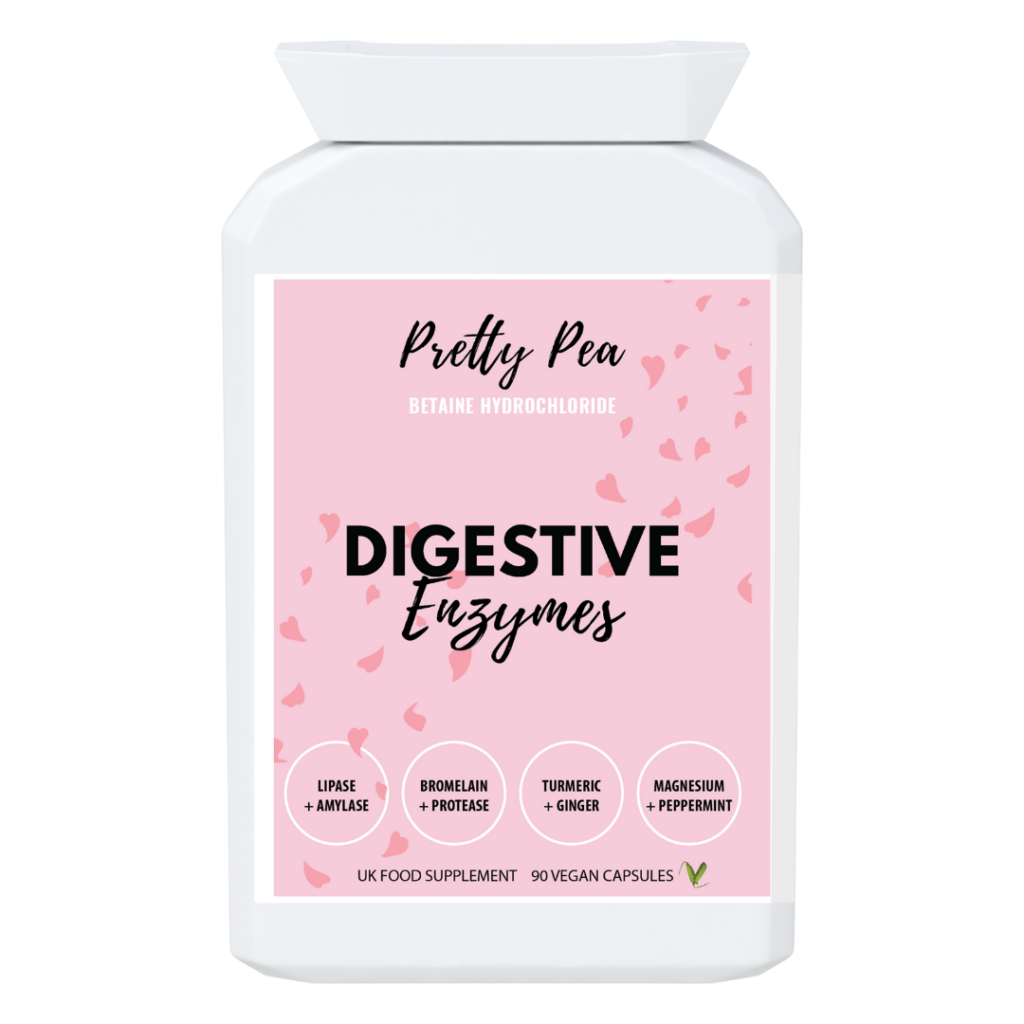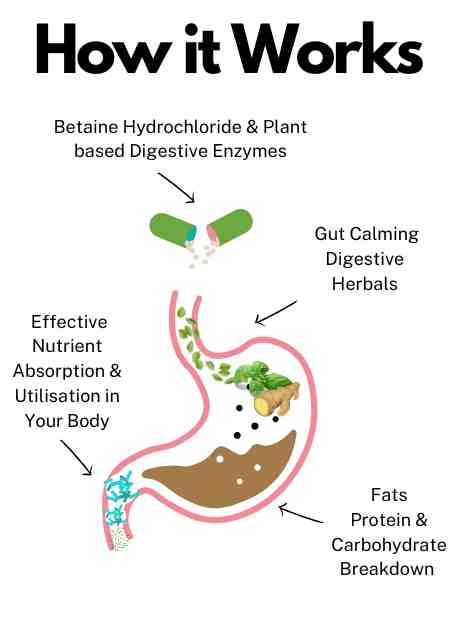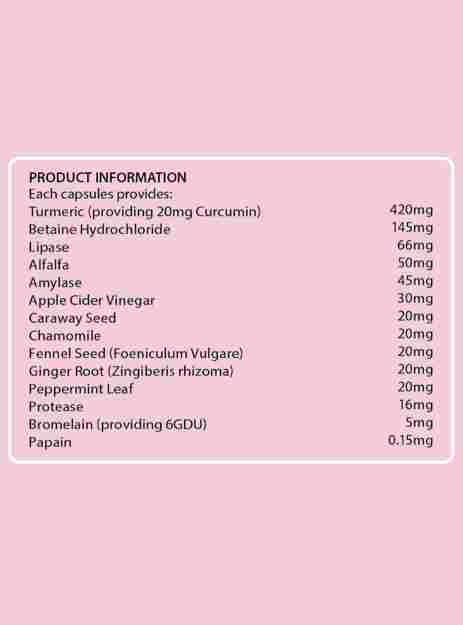Your basket is currently empty!




Digestive Enzyme Supplement
£25.99
A high strength digestive enzyme supplement. A broad spectrum range of plant-derived digestive enzymes with added digestive herbals.
Betaine Hydrochloride & High Strength plant derived Digestive Enzymes supplement
Breakdown of Fats, Carbohydrates & Protein into their Raw Components
Optimum Nutrient Absorption & Utilisation in Your Body – Helping You Make the most of Every Bite
Added Gut-Soothing Herbs Apple Cider Vinegar, Ginger, Fennel, Peppermint & more




FEEL GOOD DIGESTION STARTS FROM WITHIN
Make Every Bite Count..

Take With Meals
Take 1-2 Capsules with Meals

Fat, Carb & Protein Digestion
Support the Breakdown of Macronutrients into their Raw Components

Get The Most From Every Bite
For Optimum Nutrient Absorption & Utilisation in Your Body – Helping You Make the most of Every Calorie

Digestive Herbals
Apple Cider Vinegar, Turmeric & Digestive Herbals including Chamomile, Peppermint & Ginger
Digestive Enzymes Benefits
Digestive Enzyme Supplement Benefits
+
What are digestive enzymes
The body needs digestive enzymes to break down proteins, fats and carbohydrates into their raw components in order to make the nutrients available for optimum absorption and utilisation in your body.
Why supplement with digestive enzymes
We have a finite reserve of digestive enzymes during our lifetime. This supply can become short with age, illness or during periods of stress. Over time resulting poor digestion can lead to a whole host of conditions such as bloating, bad breath, coated tongue, indigestion, IBS, candida, flatulence, nutrient malnutrition and many more digestive complaints.
Why choose Pretty Pea Digestive Enzyme Supplement Formula
Herbs have long been used in traditional eastern medicine for digestive ailments. Studies show that Traditional Chinese Medicine (TCM) herbals can indeed alleviate intestinal inflammation.
Our high strength capsules combine a wide spectrum of plant-derived digestive enzymes with Apple Cider Vinegar, Turmeric, Ginger, Peppermint, Chamomile – calming, anti-spasmodic and gut-soothing herbs. A unique blend to naturally support your digestive system from the inside out.
How many servings
+
Contains 90 Vegan Easy Take Capsules
How to use
+
Take 1 or 2 capsules with each main meal or as advised by your health professional.
Warning: Do not take if peptic ulcers are present.
What’s Inside?
Digestive Enzymes
+
Betaine Hydrochloride
Betaine Hydrochloride is an acidic form of betaine (a vitamin-like substance). Used to provide hydrochloric acid as an aid to digestion, as production seems to decline with age.
A deficiency of gastric acid secretion increases the likelihood of certain bacterial and parasitic intestinal infections.
Too little hydrochloric acid also impairs digestion of foods (especially protein) and the absorption of nutrients.
Bromelain
Bromelain is a proteolytic protein and high-fat meals digestive enzyme derived from the pineapple plant.
Bromelain is used to support digestion, anti-inflammatory, smooth muscle relaxant and anti-oedema.
It inhibits the production of prostaglandins associated with inflammation and pain, while promoting the formation of prostaglandins with anti-inflammatory actions.
Bromelain may also assist in reducing mucous congestion.
Papain
Papain is a protein digestive enzyme found in paw-paw (papaya) fruit.
Protease
Protease is another digestive enzyme that helps with the digestion of protein.
Amylase
Amylase is a digestive enzyme that helps to digest carbohydrates.
Lipase
Lipase enzyme is a naturally occurring enzyme found in the stomach and pancreatic juice. Its function is to digest fats and lipids, helping to maintain correct gallbladder function.
Digestive Herbals
+
Turmeric (with curcumin)
Turmeric contains curcumin and has long been recognized for it’s strong antioxidant and anti-inflammatory health-promoting properties.
It’s widely used in Ayurvedic medicine as a digestive healing agent.
An aromatic, stomachic, antioxidant, carminative and bile stimulant. Supports the body’s anti-inflammatory actions, liver function and bile flow, helping to reduce loose motions and flatulence.
Studies suggest that curcumin may suppress particular inflammatory markers that play a role in excess weight and obesity.
Weight Loss
Recent scientific research reveals that curcumin directly interacts with white adipose tissue to suppress chronic inflammation.
Studies show that Curcumin supplementation can significantly reduced BMI, Body Weight, Waist Circumference and reduce obesity and it’s adverse health effects.
Animal studies also indicate that curcumin may promote weight loss, reduce fat tissue growth, curb weight regain and enhance sensitivity to the hormone insulin.
A 30-day study of people who were previously unable to lose weight, found that supplementing twice a day with 800mg of curcumin plus 8mg of piperine, led to significant reductions in body weight, body mass index (BMI), and waist and hip circumference.
Alfalfa
Alfalfa (Medicago sativa) is an herb containing calcium, potassium, phosphorous, iron and vitamins A, C, E, and K. Traditionally used by some for indigestion and to help prevent cholesterol absorption in the stomach.
This sprout contains alkaloids, isoflavones, coumarins and sterols, as well as 8 essential digestive enzymes: –
Amylase (digests starches)
Coagulase (coagulates milk)
Invertase (converts sugar into dextrose)
Emulsin (acts upon sugars)
Peroxidase (oxidases blood)
Lipase (fat-splitting enzyme)
Pectinase (forms a vegetable jelly from pectin)
Protease (digests protein)
Apple Cider Vinegar (ACV)
ACV is a popular dietary supplement promoted to curb appetite and help weight loss, support healthy blood sugar and cholesterol, and aid digestive health.
Natural Laxative
Constipation can leave you feeling bloated and heavy and Apple cider vinegar is used by many as a natural laxative.
Apple cider vinegar is a source of pectin, a type of soluble fibre found in apples. Pectin acts as a natural laxative and helps to stimulate bowel movements.
ACV & Digestion
Apple Cider Vinegar supports digestion by stimulating stomach acid and digestive enzymes.
A natural detoxifier, antiseptic, anti-catarrhal, bitter agent, digestive aid and anti-microbial, ACV helps to digest and sterilise foods, cleanse the colon and helps to regulate hydrochloric acid levels.
Apple cider vinegar is also a highly acidic substance, and it’s therefore thought that daily consumption may also help to raise stomach acid levels and give digestion a boost.
Unfiltered Apple Cider Vinegar contains strands of protein, enzymes and healthy bacteria. These probiotic properties support the growth of more beneficial bacteria in our gut – leading to a happy gut microbiome.
It’s these beneficial bacteria that help us digest and extract the nutrients from our food. Any imbalance in our microbiome, where we have low levels of good bacteria, then our bodies can’t get nutrients from food as effectively as it should. This can not only hinder weight loss but can even promote weight gain.
Weight Loss & Abdominal Fat
Weight loss studies have shown Apple cider vinegars ability to reduce abdominal fat.
A 12 week study found that drinking either 15ml or 30ml of vinegar resulted in a significant reduction in visceral / belly fat and waist circumference.
Another study concluded that daily consumption of Apple cider vinegar can reduce the visceral adiposity index – a measurement that links belly fat and cardiovascular risk factors.
Appetite Regulation
Apple Cider Vinegar may keep you fuller for longer. Research has found that acetate – a key component in acetic acid – has a central role in appetite regulation.
Taking vinegar with a meal can help to keep you feeling satisfied after eating, feeling fuller for longer and helping to curb cravings and unscheduled snacking.
Research has found that vinegar supplementation increases satiety after eating a high-carbohydrate meal.
Apple cider vinegar may also help to slow stomach emptying, keeping you feeling fuller for longer. Reducing cravings, the urge to snack and consuming less calories can help you feel more in control of your eating habits whilst promoting weight loss.
Caraway Seed
Traditionally used for treatment of indigestion, pneumonia, and as appetizer and carminative. This seed has anti-microbial, anti-spasmodic and carminative (anti-flatulence) properties.
Chamomile
Chamomile has been used for thousands of years in Greece, Rome and ancient Egypt for the treatment of stomach problems, cramps, dermatitis, and minor infections. This herb has a relaxing and calming effect on inflamed areas of the gut.
Fennel Seed
Fennel is a popular herb, its a carminative, anti-spasmodic, digestive and gut-soother.
Fennel is packed full of fibre and important nutrients such as vitamin C, calcium, magnesium, potassium and manganese. Studies have found fennel seeds to have properties including:
Antibacterial
Antifungal
Anti-inflammatory
Appetite Control
Fennel is also used to help curb appetite.
A study of healthy women found that those who drank 250 ml of tea made with 2 grams of fennel seeds before eating were significantly less hungry and consumed fewer calories during the meal than those who drank a placebo tea.
Menopause symptoms
Fennel has strong estrogenic properties, meaning that it acts similar to the hormone estrogen.
A review of 10 studies found that fennel may improve sexual function and satisfaction in menopausal women, as well as relieve hot flushes, sleep disturbances along with other menopause symptoms.
Ginger Root
Ginger is a member of a plant family that includes cardamom and turmeric with powerful medicinal properties.
Indians and Chinese are believed to have produced ginger as a tonic root for over 5000 years to treat many ailments such as colds, nausea, arthritis, migraines and hypertension.
Ginger has been used traditionally as a digestive herb with a long history in treating digestive upset and pain and as a highly effective carminative, a substance that promotes the elimination of excessive gas from the digestive system and soothes the intestinal tract.
The medicinal, chemical, and pharmacological properties of ginger have been extensively reviewed.
Benefits of Ginger
It’s main bioactive compound, Gingerol, has powerful anti-inflammatory and antioxidant effects and responsible for many of it’s medicinal properties.
Ginger with its long history of use traditional and alternative medicine is typically known for:
Calming remedy for indigestion, nausea and upset stomach
Help fight the flu and common cold
Fight inflammation and gastrointestinal ailments
Pain-relieving effect
Relieve headaches and migraines
Ginger and Weight Loss
Ginger may also play a role in weight loss. According to studies, Ginger has positive effects on weight control, obesity prevention, and energy metabolism.
A 2019 review found that ginger supplementation significantly reduced body weight, the waist-hip ratio, and the hip ratio in people with overweight or obesity.
Ginger may also play a role in weight loss. According to studies, Ginger has positive effects on weight control, obesity prevention, and energy metabolism.
A 2019 review found that ginger supplementation significantly reduced body weight, the waist-hip ratio, and the hip ratio in people with overweight or obesity.
It’s anti-inflammatory properties can also counter inflammation. Research indicates that obesity can bring on oxidative stress and inflammation.
A meta-analysis of studies demonstrated that ginger intake reduced body weight, waist to hip ratio, fasting glucose and increased HDL-cholesterol.
Ginger also has appetite-suppressing properties.
Ginger & Digestion
Ginger has also been used traditionally as a digestive herb with a long history in treating digestive upset and pain.
It supports digestion being a highly effective carminative, a substance that promotes the elimination of excessive gas from the digestive system and soothes the intestinal tract.
Peppermint Leaf
Peppermint is a well-known digestive agent used to soothe the gut lining.
It has been used for centuries as a treatment for gastrointestinal ailments. Studies indicate that peppermint relaxes the digestive system, gut spasms and may ease pain. and may relieve digestive symptoms, such as bloating, gas and indigestion.
This gut-soothing herb is packed with medicinal, phytochemical and multiple biological activities, including:
Antiseptic
Anti-inflammatory
Antiviral
Carminative
Anti-spasmodic
An enzyme activator
Source of magnesium and potassium
Irritable Bowel Syndrome (IBS)
Irritable bowel syndrome (IBS) is a chronic functional bowel disorder affecting 5.7% of the general population. Most patients relate their symptoms of IBS to foods they consume, however, although some foods may trigger symptoms, others foods, such as peppermint may provide symptom relief.
Mins have been used for centuries for their carminative (i.e. reliever of flatulence) and spasmolytic properties.
A 2014 review of nine studies of people with IBS treated with peppermint oil for at least 2 weeks concluded that peppermint provided significantly better symptom relief than a placebo.
Menstrual Cramps
Acting as a muscle relaxant, peppermint may relieve menstrual cramps.
In one study of females with painful periods, peppermint extract capsules were found to be as effective as a non-steroidal anti-inflammatory drug in reducing the intensity and duration of pain.
Safety & Contraindications
Warning: Do not take if peptic ulcers are present.
Results may vary from person to person.
Store in a cool dry place, out of the reach of children.
Best before date: see base of container.
Caution: Do not exceed the recommended daily intake.
A food supplement should not be used as a substitute for a varied, balanced diet and healthy lifestyle.
Always consult your GP before taking food supplements if you are taking medication or have an existing medical condition.
If you feel unwell, stop taking this product immediately and seek medical advice.
References
Functional foods with digestion-enhancing properties – PubMed (nih.gov)
A Descriptive Overview of the Medical Uses Given to Mentha Aromatic Herbs throughout History – PMC (nih.gov)
Caraway as Important Medicinal Plants in Management of Diseases – PubMed (nih.gov)
Does ginger supplementation lower blood pressure? A systematic review and meta-analysis of clinical trials – PubMed (nih.gov)
Effect of Fennel on the Health Status of Menopausal Women: A Systematic and Meta-analysis – PMC (nih.gov)
Chamomile: A Review of Its Traditional Uses, Chemical Constituents, Pharmacological Activities and Quality Control Studies – PubMed (nih.gov)
Peppermint oil in irritable bowel syndrome – PubMed (nih.gov)
Peppermint oil for the treatment of irritable bowel syndrome: a systematic review and meta-analysis – PubMed (nih.gov)
Evaluation of mint efficacy regarding dysmenorrhea in comparison with mefenamic acid: A double blinded randomized crossover study – PubMed (nih.gov)
The Wonderful Activities of the Genus Mentha: Not Only Antioxidant Properties – PMC (nih.gov)
Ginger on Human Health: A Comprehensive Systematic Review of 109 Randomized Controlled Trials – PMC (nih.gov)
Effect of Ginger on Inflammatory Diseases – PMC (nih.gov)
The effects of ginger intake on weight loss and metabolic profiles among overweight and obese subjects: A systematic review and meta-analysis of randomized controlled trials – PubMed (nih.gov)
Fennel (Foeniculum vulgare) and Fenugreek (Trigonella foenum-graecum) Tea Drinking Suppresses Subjective Short-term Appetite in Overweight Women – PMC (nih.gov)
Foeniculum vulgare: A comprehensive review of its traditional use, phytochemistry, pharmacology, and safety – ScienceDirect
Ginger on Human Health: A Comprehensive Systematic Review of 109 Randomized Controlled Trials – PMC (nih.gov)
The Amazing and Mighty Ginger – Herbal Medicine – NCBI Bookshelf (nih.gov)
Food supplements and diet as treatment options in irritable bowel syndrome – PubMed (nih.gov)
A Novel Delivery System of Peppermint Oil Is an Effective Therapy for Irritable Bowel Syndrome Symptoms. Dig Dis Sci. 2016 Feb;61(2):560-71. doi: 10.1007/s10620-015-3858-7. Epub 2015 Aug 29. PMID: 26319955; PMCID: PMC4729798. Food supplements and diet as treatment options in irritable bowel syndrome. Neurogastroenterol Motil. 2020 Aug;32(8):e13951. doi: 10.1111/nmo.13951. PMID: 32697018.
Peppermint oil for the treatment of irritable bowel syndrome: a systematic review and meta-analysis. J Clin Gastroenterol. 2014 Jul;48(6):505-12. doi: 10.1097/MCG.0b013e3182a88357. PMID: 24100754.
Fennel (Foeniculum vulgare) and Fenugreek (Trigonella foenum-graecum) Tea Drinking Suppresses Subjective Short-term Appetite in Overweight Women. Clin Nutr Res. 2015 Jul;4(3):168-74. doi: 10.7762/cnr.2015.4.3.168. Epub 2015 Jul 31. PMID: 26251835; PMCID: PMC4525133.
Effect of Fennel on the Health Status of Menopausal Women: A Systematic and Meta-analysis. J Menopausal Med. 2018 Apr;24(1):67-74. doi: 10.6118/jmm.2018.24.1.67. Epub 2018 Apr 30. PMID: 29765930; PMCID: PMC5949311.
Anh NH, Kim SJ, Long NP, Min JE, Yoon YC, Lee EG, Kim M, Kim TJ, Yang YY, Son EY, Yoon SJ, Diem NC, Kim HM, Kwon SW. Ginger on Human Health: A Comprehensive Systematic Review of 109 Randomized Controlled Trials. Nutrients. 2020 Jan 6;12(1):157. doi: 10.3390/nu12010157. PMID: 31935866; PMCID: PMC7019938.
Ballester P, Cerdá B, Arcusa R, Marhuenda J, Yamedjeu K, Zafrilla P. Effect of Ginger on Inflammatory Diseases. Molecules. 2022 Oct 25;27(21):7223. doi: 10.3390/molecules27217223. PMID: 36364048; PMCID: PMC9654013.
Effect of ginger (Zingiber officinale) supplementation on oxidative stress parameters: A systematic review and meta-analysis. J Food Biochem. 2021 Feb;45(2):e13612. doi: 10.1111/jfbc.13612. Epub 2021 Jan 17. PMID: 33458848.
The effects of ginger supplementation on markers of inflammatory and oxidative stress: A systematic review and meta-analysis of clinical trials. Phytother Res. 2020 Aug;34(8):1723-1733. doi: 10.1002/ptr.6638. Epub 2020 Mar 8. PMID: 32147845.
Does ginger supplementation lower blood pressure? A systematic review and meta-analysis of clinical trials. Phytother Res. 2019 Jun;33(6):1639-1647. doi: 10.1002/ptr.6362. Epub 2019 Apr 11. PMID: 30972845.
The effects of ginger intake on weight loss and metabolic profiles among overweight and obese subjects: A systematic review and meta-analysis of randomized controlled trials. Crit Rev Food Sci Nutr. 2019;59(11):1753-1766. doi: 10.1080/10408398.2018.1427044. Epub 2018 Feb 2. PMID: 29393665.
The effects of ginger intake on weight loss and metabolic profiles among overweight and obese subjects: A systematic review and meta-analysis of randomized controlled trials. Crit Rev Food Sci Nutr. 2019;59(11):1753-1766. doi: 10.1080/10408398.2018.1427044. Epub 2018 Feb 2. PMID: 29393665.
Efficacy and Safety of Peppermint Oil in a Randomized, Double-Blind Trial of Patients With Irritable Bowel Syndrome – PubMed (nih.gov)
Beneficial effects of Apple Cider Vinegar on weight management, Visceral Adiposity Index and lipid profile in overweight or obese subjects receiving restricted calorie diet: A randomized clinical trial – ScienceDirect
Vinegar intake reduces body weight, body fat mass, and serum triglyceride levels in obese Japanese subjects – PubMed (nih.gov)
Effect and mechanisms of action of vinegar on glucose metabolism, lipid profile, and body weight – PubMed (nih.gov)
Betaine in Inflammation: Mechanistic Aspects and Applications – PubMed (nih.gov)
Digestive enzymes of human and nonhuman primates – PubMed (nih.gov)
Beneficial Properties of Bromelain – PubMed (nih.gov)
Curcumin, an active component of turmeric (Curcuma longa), and its effects on health – PubMed (nih.gov)
The effect of curcumin supplementation on weight loss and anthropometric indices: an umbrella review and updated meta-analyses of randomized controlled trials – PubMed (nih.gov)
Curcumin and obesity – PubMed (nih.gov)
Therapeutic effects of turmeric in several diseases: An overview – PubMed (nih.gov)
Turmeric-derived nanovesicles as novel nanobiologics for targeted therapy of ulcerative colitis – PubMed (nih.gov)
Traditional Chinese Medicine: A promising strategy to regulate the imbalance of bacterial flora, impaired intestinal barrier and immune function attributed to ulcerative colitis through intestinal microecology – PubMed (nih.gov)
Effects of Traditional Chinese Medicine on Serum Cytokines for the Dampness-heat Syndrome of Ulcerative Colitis: A Systematic Review and Meta-analysis – PubMed (nih.gov)
Potential activity of Traditional Chinese Medicine against Ulcerative colitis: A review – PubMed (nih.gov)
Effects of Turmeric (Curcuma longa) on Skin Health: A Systematic Review of the Clinical Evidence – PubMed (nih.gov)
The effects of ginger intake on weight loss and metabolic profiles among overweight and obese subjects: A systematic review and meta-analysis of randomized controlled trials – PubMed (nih.gov)
Beneficial effects of Apple Cider Vinegar on weight management, Visceral Adiposity Index and lipid profile in overweight or obese subjects receiving restricted calorie diet: A randomized clinical trial – ScienceDirect
Vinegar intake reduces body weight, body fat mass, and serum triglyceride levels in obese Japanese subjects – PubMed (nih.gov)
Effect and mechanisms of action of vinegar on glucose metabolism, lipid profile, and body weight – PubMed (nih.gov)
Review article: the physiological effects and safety of peppermint oil and its efficacy in irritable bowel syndrome and other functional disorders – PubMed (nih.gov)
Ginger on Human Health: A Comprehensive Systematic Review of 109 Randomized Controlled Trials – PMC (nih.gov)
The Amazing and Mighty Ginger – Herbal Medicine – NCBI Bookshelf (nih.gov)
The improvement effect of apple cider vinegar as a functional food on anthropometric indices, blood glucose and lipid profile in diabetic patients: a randomized controlled clinical trial – PubMed (nih.gov)
Lipases: Sources, Production, Purification, and Applications – PubMed (nih.gov)
Human pancreatic digestive enzymes – PubMed (nih.gov)